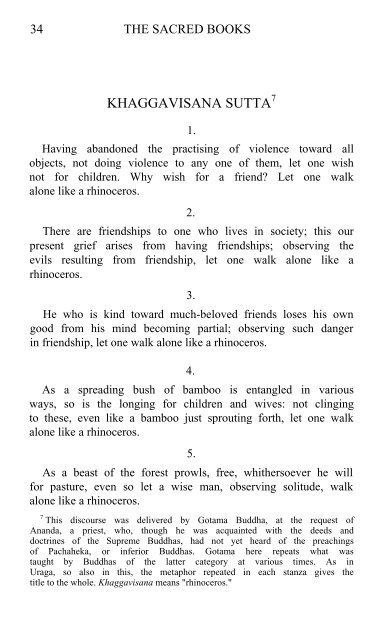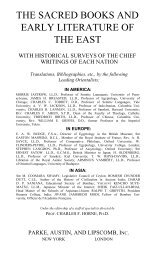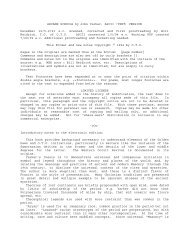- Page 1 and 2: THE SACRED BOOKS AND EARLY LITERATU
- Page 3: BUDDHA'S REPOSE. Buddha, during his
- Page 6 and 7: "Let there be light."—GENESIS I,
- Page 8 and 9: vi CONTENTS PAGE VII.—LATER TEACH
- Page 10 and 11: "As the great sea, O disciples, is
- Page 12 and 13: 4 THE SACRED BOOKS been spread abro
- Page 14 and 15: 6 THE SACRED BOOKS the imaginary pr
- Page 16 and 17: 8 THE SACRED BOOKS It was the missi
- Page 18 and 19: 10 THE SACRED BOOKS much change the
- Page 21 and 22: O THE EDICTS OF ASOKA (INTRODUCTION
- Page 23 and 24: THE EDICTS OF ASOKA ——— THE E
- Page 25 and 26: LITERATURE OF THE EAST 17 ASOKA'S M
- Page 27 and 28: LITERATURE OF THE EAST 19 A MESSAGE
- Page 29: LITERATURE OF THE EAST 21 7. "To ou
- Page 33 and 34: A THE EARLIEST SUTTAS (INTRODUCTION
- Page 35 and 36: LITERATURE OF THE EAST 27 about by
- Page 37 and 38: LITERATURE OF THE EAST 29 7. The pr
- Page 39 and 40: LITERATURE OF THE EAST 31 DHANIYA S
- Page 41: LITERATURE OF THE EAST 33 which has
- Page 45 and 46: LITERATURE OF THE EAST 37 20. The a
- Page 47 and 48: LITERATURE OF THE EAST 39 the middl
- Page 49 and 50: LITERATURE OF THE EAST 41 THE FOUND
- Page 51 and 52: LITERATURE OF THE EAST 43 "This, O
- Page 53 and 54: LITERATURE OF THE EAST 45 among the
- Page 55 and 56: LITERATURE OF THE EAST 47 without a
- Page 57: THE BOOK OF THE GREAT DECEASE TRANS
- Page 60 and 61: 52 THE SACRED BOOKS The Blessed One
- Page 62 and 63: 54 THE SACRED BOOKS the King, sayin
- Page 64 and 65: 56 THE SACRED BOOKS And he did so;
- Page 66 and 67: 58 THE SACRED BOOKS tions, so long
- Page 68 and 69: 60 THE SACRED BOOKS 15. Now when th
- Page 70 and 71: 62 THE SACRED BOOKS Great is the fr
- Page 72 and 73: 64 THE SACRED BOOKS Pataligama had
- Page 74 and 75: 66 THE SACRED BOOKS lowed him as he
- Page 76 and 77: 68 THE SACRED BOOKS intellect when
- Page 78 and 79: 70 THE SACRED BOOKS the disciples o
- Page 80 and 81: 72 THE SACRED BOOKS she was thus se
- Page 82 and 83: 74 THE SACRED BOOKS before the orde
- Page 84 and 85: 76 THE SACRED BOOKS that the Blesse
- Page 86 and 87: 78 THE SACRED BOOKS 3. "Ananda! who
- Page 88 and 89: 80 THE SACRED BOOKS lar in all its
- Page 90 and 91: 82 THE SACRED BOOKS he can make thi
- Page 92 and 93:
84 THE SACRED BOOKS 25. "When a man
- Page 94 and 95:
86 THE SACRED BOOKS nothing at all
- Page 96 and 97:
88 THE SACRED BOOKS thoroughly prac
- Page 98 and 99:
90 THE SACRED BOOKS Vesali at the U
- Page 100 and 101:
92 THE SACRED BOOKS and sat down th
- Page 102 and 103:
94 THE SACRED BOOKS CHAPTER IV 1. N
- Page 104 and 105:
96 THE SACRED BOOKS Ananda, and sai
- Page 106 and 107:
98 THE SACRED BOOKS been well grasp
- Page 108 and 109:
100 THE SACRED BOOKS "Even so, Lord
- Page 110 and 111:
102 THE SACRED BOOKS Ananda, some w
- Page 112 and 113:
104 THE SACRED BOOKS goes on beatin
- Page 114 and 115:
106 THE SACRED BOOKS man, and said:
- Page 116 and 117:
108 THE SACRED BOOKS robe in four a
- Page 118 and 119:
110 THE SACRED BOOKS with its head
- Page 120 and 121:
112 THE SACRED BOOKS 10. "In great
- Page 122 and 123:
114 THE SACRED BOOKS say, 'Here was
- Page 124 and 125:
116 THE SACRED BOOKS "A Tathagata,
- Page 126 and 127:
118 THE SACRED BOOKS things most ne
- Page 128 and 129:
120 THE SACRED BOOKS "Let not the B
- Page 130 and 131:
122 THE SACRED BOOKS of Kusinara to
- Page 132 and 133:
124 THE SACRED BOOKS son of the Bel
- Page 134 and 135:
126 THE SACRED BOOKS spirit, receiv
- Page 136 and 137:
128 THE SACRED BOOKS 5. Then the Bl
- Page 139 and 140:
LITERATURE OF THE EAST 129 backward
- Page 141 and 142:
LITERATURE OF THE EAST 131 16. When
- Page 143 and 144:
LITERATURE OF THE EAST 133 Mallas o
- Page 145 and 146:
LITERATURE OF THE EAST 135 south, a
- Page 147 and 148:
LITERATURE OF THE EAST 137 high roa
- Page 149 and 150:
LITERATURE OF THE EAST 139 place wh
- Page 151 and 152:
LITERATURE OF THE EAST 141 caste. W
- Page 153:
LITERATURE OF THE EAST 143 gama ove
- Page 157 and 158:
T LATER LEGENDS OF THE LIFE OF BUDD
- Page 159 and 160:
THE BUDDHA CHARITA OR CHINESE LIFE
- Page 161 and 162:
LITERATURE OF THE EAST 151 had paid
- Page 163 and 164:
LITERATURE OF THE EAST 153 with suc
- Page 165 and 166:
LITERATURE OF THE EAST 155 entertai
- Page 167 and 168:
LITERATURE OF THE EAST 157 like the
- Page 169 and 170:
LITERATURE OF THE EAST 159 chariot,
- Page 171 and 172:
LITERATURE OF THE EAST 161 him as h
- Page 173 and 174:
LITERATURE OF THE EAST 163 to virtu
- Page 175 and 176:
LITERATURE OF THE EAST 165 face, fe
- Page 177 and 178:
LITERATURE OF THE EAST 167 afflicte
- Page 179 and 180:
LITERATURE OF THE EAST 169 every ch
- Page 181 and 182:
LITERATURE OF THE EAST 171 throne;
- Page 183 and 184:
LITERATURE OF THE EAST 173 and fore
- Page 185 and 186:
LITERATURE OF THE EAST 175 to gain
- Page 187 and 188:
LITERATURE OF THE EAST 177 enemy an
- Page 189 and 190:
LITERATURE OF THE EAST 179 who is t
- Page 191 and 192:
LITERATURE OF THE EAST 181 And such
- Page 193 and 194:
LITERATURE OF THE EAST 183 by which
- Page 195 and 196:
LITERATURE OF THE EAST 185 of his c
- Page 197 and 198:
LITERATURE OF THE EAST 187 Seizing
- Page 199 and 200:
LITERATURE OF THE EAST 189 shook an
- Page 201 and 202:
LITERATURE OF THE EAST 191 norance
- Page 203:
SIDDHARTHA SETS OUT UPON HIS MISSIO
- Page 206 and 207:
194 THE SACRED BOOKS despicable joy
- Page 208 and 209:
196 THE SACRED BOOKS would have men
- Page 210 and 211:
198 THE SACRED BOOKS four kings off
- Page 212 and 213:
200 THE SACRED BOOKS peaceful cattl
- Page 214 and 215:
202 THE SACRED BOOKS my city of ref
- Page 216 and 217:
204 THE SACRED BOOKS the name; the
- Page 218 and 219:
206 THE SACRED BOOKS I adore the la
- Page 220 and 221:
208 THE SACRED BOOKS highest order
- Page 222 and 223:
210 THE SACRED BOOKS womb of the Pr
- Page 224 and 225:
212 THE SACRED BOOKS etc., he did n
- Page 226 and 227:
214 THE SACRED BOOKS grandfather of
- Page 228 and 229:
216 THE SACRED BOOKS had come to en
- Page 230 and 231:
218 THE SACRED BOOKS of Thumeda. Du
- Page 232 and 233:
220 THE SACRED BOOKS the age and qu
- Page 234 and 235:
222 THE SACRED BOOKS who is to beco
- Page 236 and 237:
224 THE SACRED BOOKS with cow-dung,
- Page 238 and 239:
226 THE SACRED BOOKS the seat of Ts
- Page 240 and 241:
228 THE SACRED BOOKS friends and re
- Page 242 and 243:
230 THE SACRED BOOKS of Nats receiv
- Page 244 and 245:
232 THE SACRED BOOKS The inhabitant
- Page 246 and 247:
234 THE SACRED BOOKS dewila. They a
- Page 248 and 249:
236 THE SACRED BOOKS dream of Maia
- Page 250 and 251:
238 THE SACRED BOOKS all corporal d
- Page 252 and 253:
240 THE SACRED BOOKS Sensible of th
- Page 254 and 255:
242 THE SACRED BOOKS cations of a R
- Page 256 and 257:
244 THE SACRED BOOKS and graceful d
- Page 258 and 259:
246 THE SACRED BOOKS lay with one o
- Page 260 and 261:
248 THE SACRED BOOKS ing came of it
- Page 262 and 263:
250 THE SACRED BOOKS filter." 3 He
- Page 264 and 265:
252 THE SACRED BOOKS what sort of b
- Page 266 and 267:
254 THE SACRED BOOKS fell in with a
- Page 268 and 269:
256 THE SACRED BOOKS some said: "Th
- Page 270 and 271:
258 THE SACRED BOOKS I marry a husb
- Page 272 and 273:
260 THE SACRED BOOKS waited the bre
- Page 274 and 275:
262 THE SACRED BOOKS Naga, and made
- Page 276 and 277:
264 THE SACRED BOOKS them. On heari
- Page 278 and 279:
266 THE SACRED BOOKS you have not y
- Page 280 and 281:
268 THE SACRED BOOKS fell gently ov
- Page 282 and 283:
270 THE SACRED BOOKS recollected th
- Page 284 and 285:
272 THE SACRED BOOKS effulgent beau
- Page 286 and 287:
274 THE SACRED BOOKS and feet emana
- Page 288 and 289:
276 THE SACRED BOOKS inquired about
- Page 290 and 291:
278 THE SACRED BOOKS Buddha continu
- Page 292 and 293:
280 THE SACRED BOOKS try, in a sout
- Page 294 and 295:
282 THE SACRED BOOKS CHAPTER VI Hav
- Page 296 and 297:
284 THE SACRED BOOKS turning on the
- Page 298 and 299:
286 THE SACRED BOOKS of Upaka, and
- Page 300 and 301:
288 THE SACRED BOOKS that position
- Page 302 and 303:
290 THE SACRED BOOKS THE BUDDHA SON
- Page 305 and 306:
T THE JATAKA (INTRODUCTION) HE Jata
- Page 307 and 308:
LITERATURE OF THE EAST 295 "Then le
- Page 309 and 310:
LITERATURE OF THE EAST 297 sions? W
- Page 311 and 312:
LITERATURE OF THE EAST 299 A BIRTH-
- Page 313 and 314:
LITERATURE OF THE EAST 301 bunch of
- Page 315 and 316:
LITERATURE OF THE EAST 303 lotuses.
- Page 317 and 318:
LITERATURE OF THE EAST 305 Both sta
- Page 319 and 320:
LITERATURE OF THE EAST 307 stroke t
- Page 321 and 322:
LITERATURE OF THE EAST 309 successi
- Page 323 and 324:
LITERATURE OF THE EAST 311 such unh
- Page 325:
THE DHAMMAPADA THE MOST CELEBRATED
- Page 328 and 329:
316 THE SACRED BOOKS ligious writin
- Page 330 and 331:
318 THE SACRED BOOKS But he who has
- Page 332 and 333:
320 THE SACRED BOOKS CHAPTER III TH
- Page 335 and 336:
LITERATURE OF THE EAST 321 CHAPTER
- Page 337 and 338:
LITERATURE OF THE EAST 323 That dee
- Page 339 and 340:
LITERATURE OF THE EAST 325 quered,
- Page 341 and 342:
LITERATURE OF THE EAST 327 And he w
- Page 343 and 344:
LITERATURE OF THE EAST 329 If, like
- Page 345 and 346:
LITERATURE OF THE EAST 331 Let each
- Page 347 and 348:
LITERATURE OF THE EAST 333 difficul
- Page 349 and 350:
LITERATURE OF THE EAST 335 the lear
- Page 351 and 352:
LITERATURE OF THE EAST 337 Leave th
- Page 353 and 354:
LITERATURE OF THE EAST 339 and guid
- Page 355 and 356:
LITERATURE OF THE EAST 341 Out down
- Page 357 and 358:
LITERATURE OF THE EAST 343 fire, th
- Page 359 and 360:
LITERATURE OF THE EAST 345 pleasant
- Page 361 and 362:
LITERATURE OF THE EAST 347 stands t
- Page 363 and 364:
LITERATURE OF THE EAST 349 And this
- Page 365 and 366:
LITERATURE OF THE EAST 351 and the
- Page 367:
LITERATURE OF THE EAST 353 Him I ca
- Page 371 and 372:
T LATER TEACHINGS (INTRODUCTION) HE
- Page 373 and 374:
LATER TEACHINGS ——— THE GREAT
- Page 375 and 376:
LITERATURE OF THE EAST 361 and frui
- Page 377 and 378:
LITERATURE OF THE EAST 363 and roll
- Page 379 and 380:
LITERATURE OF THE EAST 365 43 "Such
- Page 381 and 382:
LITERATURE OF THE EAST 367 50. "In
- Page 383 and 384:
LITERATURE OF THE EAST 369 "Then, A
- Page 385 and 386:
LITERATURE OF THE EAST 371 brick wa
- Page 387 and 388:
LITERATURE OF THE EAST 373 at, and
- Page 389 and 390:
LITERATURE OF THE EAST 375 CHAPTER
- Page 391 and 392:
LITERATURE OF THE EAST 377 with tho
- Page 393 and 394:
LITERATURE OF THE EAST 379 " 'Arise
- Page 395 and 396:
LITERATURE OF THE EAST 381 "the Cha
- Page 397 and 398:
LITERATURE OF THE EAST 383 of horse
- Page 399 and 400:
LITERATURE OF THE EAST 385 " 'Thine
- Page 401 and 402:
LITERATURE OF THE EAST 387 38. "Of
- Page 403 and 404:
LITERATURE OF THE EAST 389 THE WAY
- Page 405 and 406:
LITERATURE OF THE EAST 391 "How am
- Page 407 and 408:
LITERATURE OF THE EAST 393 fruit in
- Page 409 and 410:
LITERATURE OF THE EAST 395 of exist
- Page 411 and 412:
LITERATURE OF THE EAST 397 element
- Page 413:
LITERATURE OF THE EAST 399 Therefor




